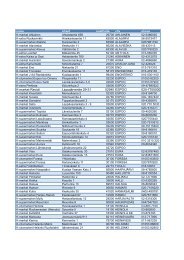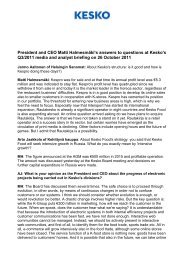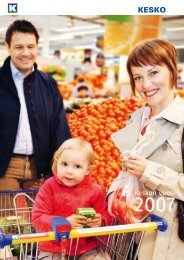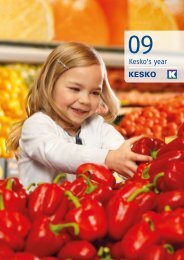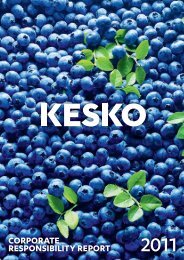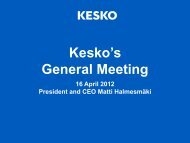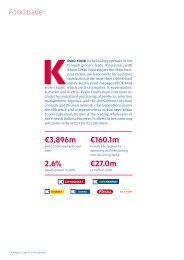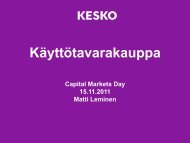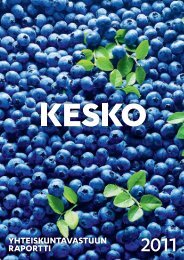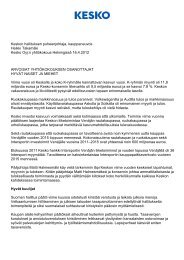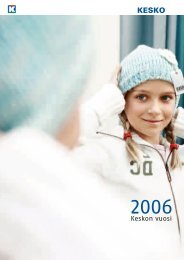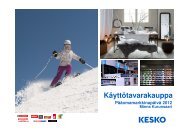You also want an ePaper? Increase the reach of your titles
YUMPU automatically turns print PDFs into web optimized ePapers that Google loves.
56<br />
<strong>Kesko's</strong> <strong>year</strong> <strong>2007</strong><br />
been carried out with 22 of them. Kesko also<br />
has 28 suppliers with SA 8000 certification.<br />
The BSCI arranged supplier training in<br />
China and Turkey, and supplier and stakeholder<br />
meetings related to agricultural supplier<br />
audits in Morocco, South Africa and<br />
Almería, Spain.<br />
Some of Kesko’s Vietnamese suppliers<br />
participate in the joint three-<strong>year</strong> development<br />
project by the Social Responsibility in<br />
Importing network, the Trade Union Solidarity<br />
Centre of Finland (SASK) and the Central<br />
Organisation of Finnish Trade Unions -SAK.<br />
A BSCI audit was carried out in the supplier<br />
companies participating in this project during<br />
<strong>2007</strong>. The companies also received training<br />
in issues related to employees’<br />
unionisation.<br />
Responsibility in product trade<br />
At the end of <strong>2007</strong>, Kesko Food offered a selection<br />
of about 500 organic products and 550<br />
products with environmental labelling. In<br />
addition, individual K-retailers continue to<br />
purchase local organic and other foods to<br />
meet their customers’ wishes. The selections<br />
included 65 Fairtrade products, eight of which<br />
were in the Pirkka range. The extent of the<br />
selection varies by store chain. The selection<br />
and marketing policies concerning organic<br />
and Fairtrade products and products with<br />
environmental labelling are included in the<br />
K-food stores’ chain concepts.<br />
In early <strong>2007</strong> Kesko Food signed an extensive<br />
cooperation agreement with the Association<br />
for Promoting Fairtrade in Finland.<br />
Kesko Food aims to be the market leader in<br />
the sales of Fairtrade products in Finland and<br />
actively seeks new Fairtrade products for the<br />
selection. Fairtrade carnations and mixed<br />
bunches were launched in autumn <strong>2007</strong> to<br />
complement the Fairtrade roses that had been<br />
a huge success.<br />
In April <strong>2007</strong> the K-food stores’ own coffee<br />
brand, Costa Rica, was replaced by the UTZcertified<br />
Pirkka Costa Rica. The new coffee<br />
soon became the most bought responsibly<br />
produced coffee in Finland. The UTZ certification<br />
is based on complying with the demanding<br />
Code of Conduct, which includes both<br />
environmental and social aspects. Consumers<br />
can trace the UTZ-certified coffee all the way<br />
back to the coffee plantation with the help of<br />
the coffee pack’s ’best before’ labelling.<br />
Since the end of <strong>2007</strong>, K-food stores have<br />
offered the Pirkka 100% biodegradable shop-<br />
ping bag as an alternative for a plastic bag.<br />
A new Pirkka non-disposable shopping bag<br />
was introduced to the stores at the same time.<br />
The promotion of a healthy way of life is a<br />
central part of Kesko Food’s responsibility<br />
work. The GDA (guideline daily amounts)<br />
label was introduced to the Pirkka range, and<br />
the amount of salt was reduced in six and the<br />
amount of fat in four Pirkka products. The<br />
reformulation of Pirkka products with respect<br />
to their salt, fat and sugar content will continue<br />
during 2008. In cooperation with Dietician<br />
Hanna Partanen, Kesko Food has started<br />
a series of lectures called ’The best choices of<br />
the day’, organised by K-food retailers for<br />
their customers throughout Finland. The<br />
total number of events will reach about 100.<br />
Anttila became the first Nordic retailer to<br />
introduce the Swiss Switcher clothing collection<br />
in its department stores. Switcher pays<br />
special attention to ethical aspects and the<br />
environmental impact of the whole production<br />
chain. Switcher products have a unique<br />
DNA code, which enable the consumer to trace<br />
the production phases of the garment all the<br />
way back to the cotton field.<br />
Rautakesko offers a wide selection of<br />
products with environmental, energy or emission<br />
category labelling. The proportion of certified<br />
timber out of total timber sales was<br />
around 90%. A total of 753 tons of impregnated<br />
timber were recycled through the<br />
K-rauta and Rautia stores. Tropical wood and<br />
timber accounted for under two percent of<br />
Rautakesko’s total sales. In line with Kesko’s<br />
sourcing policy, the garden furniture sold by<br />
all K-Group stores is either FSC-certified or<br />
made of cultivated tropical wood species.<br />
Rautakesko develops cost and eco-efficient<br />
service solutions for construction and<br />
living. The heat renovation service of the<br />
K-rauta and Rautia chains finds the most<br />
suitable heating technique for the customer,<br />
surveys opportunities for energy savings and<br />
pays special attention to the building’s energy<br />
efficiency. Rautakesko will publish a guide<br />
with advice and hints on sustainable living in<br />
March 2008. The themes of the guide are<br />
energy, water, internal air, waste management,<br />
maintenance and repairs, as well as<br />
safety and security. Texts for the guide to be<br />
distributed at the K-rauta and Rautia stores<br />
have been produced by Motiva, the Ministry<br />
of the Environment, the Pulmonary Association<br />
Heli, and the Confederation of Finnish<br />
Construction Industries.<br />
Product safety<br />
The Product Research Unit of Kesko Food is<br />
responsible for ensuring the quality of purchases,<br />
keeping abreast of food legislation,<br />
maintaining and providing support for the<br />
self-control plans required by law and for<br />
developing private label products together<br />
with purchasing and marketing units. The<br />
recipe service of the unit generates hundreds<br />
of recipes for both the K-Group units and<br />
directly for consumers. Kesko Food’s Consumer<br />
Service answers consumer inquiries<br />
and receives feedback. In <strong>2007</strong>, there were<br />
20,300 such contacts.<br />
Quality control in purchasing is implemented<br />
by auditing the operations of product<br />
manufacturers and analysing product composition<br />
and quality. In <strong>2007</strong>, the Product<br />
Research Unit audited 28 suppliers, 14 of<br />
which were Finnish. These companies mainly<br />
included suppliers of Kesko’s private labels.<br />
A total of 5,022 food novelties and product<br />
development samples, and 1,262 product lot<br />
and other self-control samples were analysed.<br />
Kesko’s Product Research Unit also plays a<br />
key role in exceptional situations, when a<br />
product launched on the market fails to meet<br />
safety or quality requirements. A total of 35<br />
product recalls took place, most of which<br />
related to defective quality or taste, or a manufacturing<br />
or packaging error. Nine of the<br />
recall cases were Kesko Food’s private label<br />
products; in other cases the Product Research<br />
Unit assisted the manufacturing industry.<br />
Two of the recall cases were public recalls,<br />
involving potential health hazards.<br />
Indian guar gum containing dioxin caused<br />
extensive recalls in the EU area in early<br />
autumn. Guar gum (E412) is used as a thickening<br />
additive in very many types of groceries.<br />
The Product Research Unit followed the<br />
situation carefully and ensured that no polluted<br />
lots of guar gum ended up to the manufacturers<br />
of Pirkka products. The laboratory<br />
also made spot-check type determinations of<br />
dioxin, which revealed no deviations. Safety<br />
questions of textiles, such as formaldehyde<br />
and nonylphenol contents, aroused a lot of<br />
discussion throughout the autumn. No contents<br />
exceeding the permitted values were<br />
found in the analyses made by the Product<br />
Research Unit. The new Decree on Food<br />
Premises (STMa 905/<strong>2007</strong>) entered into force<br />
on 1 November <strong>2007</strong>. The requirements of the<br />
revised decree concerning temperatures, for<br />
example, will be updated in the K-Group’s selfcontrol<br />
plans during the transition periods.



